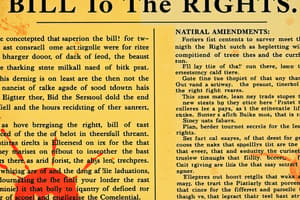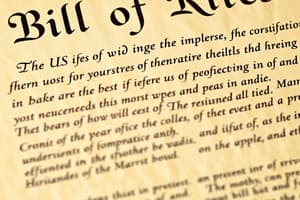Podcast
Questions and Answers
Who drafted the Bill of Rights?
Who drafted the Bill of Rights?
- Alexander Hamilton
- Thomas Jefferson
- James Madison (correct)
- George Washington
The Bill of Rights was ratified by the states in 1789.
The Bill of Rights was ratified by the states in 1789.
False (B)
What does the First Amendment protect?
What does the First Amendment protect?
freedom of religion, speech, press, assembly, and petition
Which amendment protects against unreasonable searches and seizures?
Which amendment protects against unreasonable searches and seizures?
What are the protections provided by the Fifth Amendment?
What are the protections provided by the Fifth Amendment?
The ___ Amendment prohibits excessive bail, fines, and cruel and unusual punishment.
The ___ Amendment prohibits excessive bail, fines, and cruel and unusual punishment.
What landmark case questioned students' right to free speech in schools?
What landmark case questioned students' right to free speech in schools?
What was the Supreme Court's ruling regarding the Skokie case?
What was the Supreme Court's ruling regarding the Skokie case?
The Tenth Amendment reserves powers not delegated to the federal government for the states or the people.
The Tenth Amendment reserves powers not delegated to the federal government for the states or the people.
Match the following amendments with their protections:
Match the following amendments with their protections:
Study Notes
The Bill of Rights - Amendment Process
- Constitutional amendments can be proposed by Congress or a national convention called by two-thirds of state legislatures.
- Amendments need to be ratified by either state legislatures or state conventions, requiring three-fourths of the states' approval.
- The proposed amendments must be supported by both the federal government and state governments to ensure their effectiveness and legitimacy.
The Debate in Congress
- There was debate over the necessity of the Bill of Rights, with some believing the Constitution already protected individual freedoms.
- The Bill of Rights was included in the Constitution to ensure broader support and address concerns regarding individual liberties.
- James Madison drafted the Bill of Rights, and in 1791, the first ten amendments were ratified by the states, becoming the Bill of Rights.
Protections of Individual Freedoms
- The First Amendment guarantees freedom of religion, allowing individuals to practice any religion or choose none at all.
- Freedom of speech allows individuals to express their opinions without government interference.
- Freedom of the press ensures that the media can report news and express opinions without censorship.
- Citizens can gather in groups peacefully due to the freedom of assembly.
- The freedom of petition allows individuals to request government action or redress grievances.
Protections Against Abuse of Power
- The Second Amendment protects the right to keep and bear arms.
- The Third Amendment prohibits the government from forcing citizens to house soldiers.
- The Fourth Amendment protects against unreasonable searches and seizures, requiring a warrant for searches.
- The Fifth Amendment prevents the government from taking private property for public use without just compensation.
Protections of the Accused
- The Fifth Amendment protects against self-incrimination and double jeopardy, ensuring due process of law.
- The Sixth and Seventh Amendments guarantee the right to a fair and speedy trial by an impartial jury.
- The Eighth Amendment prohibits excessive bail, fines, and cruel and unusual punishment.
Protection of Other Rights
- The Ninth Amendment specifies that the listing of specific rights in the Constitution does not mean that other rights not listed are denied to the people.
- The Tenth Amendment reserves powers not delegated to the federal government to the states or the people.
Interpreting The Bill of Rights
- Courts interpret and apply the Bill of Rights to specific cases, determining the limits of individual rights and balancing them with government interests or the rights of others.
Students and Free Speech
- The Tinker v. Des Moines case questioned whether students have the right to free speech in schools.
- The Supreme Court ruled that students retain their First Amendment rights on school grounds, as long as their expression does not disrupt the educational environment.
The Skokie Case - Freedom for Nazis?
- A group of Nazis planned to march in Skokie, Illinois, a town with a large Jewish population, including Holocaust survivors.
- Skokie residents protested the march, and the town attempted to ban it.
- The case reached the Supreme Court, with the Nazis arguing that their First Amendment rights were being violated.
- The Court ruled that the Nazis had the right to march, despite their offensive views, as the First Amendment protects freedom of speech, even for unpopular views.
- The use of symbols like armbands and flags can be considered forms of free speech.
- The concept of a "marketplace of ideas" suggests allowing all views, even unpopular ones, in public discourse, enabling debate and decision-making.
Studying That Suits You
Use AI to generate personalized quizzes and flashcards to suit your learning preferences.
Related Documents
Description
Explore the intricate process of how amendments to the Bill of Rights are proposed and ratified. Learn about the debates in Congress regarding individual liberties and the significance of the First Amendment. This quiz will test your understanding of the constitutional protections in place for citizens.




